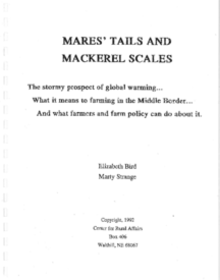A report by Elizabeth Bird and Marty Strange
The old timers used to say that when clouds took the shape of mares' tails or mackerel scales, a storm would soon strike. Although weather forecasting is more technical today, it might not be much more accurate, especially if so-called ''greenhouse gas'' emissions destabilize the climate and increase the uncertainty of weather events. The prospect of more erratic and perhaps more violent weather patterns is especially troublesome to farmers, whose livelihoods are traumatized by unstable agronomic conditions. Mares tails and mackerel scales spell trouble on the farm.
That is especially true out here in the region novelist Hamlin Garland referred to as the "Middle Border," where the subhumid Corn Belt gradually gives way to the semi-arid Great Plains. Here, the weather is already so volatile and so severe that it has always been a source of desperate, self-defensive humor. There's the one about the Nebraska farmer who died and was cremated, but after four hours in the furnace he suddenly sat up and observed, 'If this weather don't let up, I don't believe we're gonna get a corn crop this year." Or the one about the farmer who lamented during a drought, "I don't care whether it ever rains again—I've seen rain before—but my 10-year-old son, well... "
Everywhere farming is important, the weather is, too.
So, farmers and those who live in farming areas should be especially concerned about the widely reported prospect that human activity causes the release of gases into the atmosphere that will change the climate. These greenhouse gases may cause a global warming effect that permanently and substantially alters agriculture as we know it, threatening to dislocate and ruin many farmers.
We have set out to understand and explain the global warming and climate change issue as it affects agriculture especially in the American Midwest. Specifically, the task before us has been fourfold:
- To summarize the findings of available studies that predict how the climate in the American Midwest might change due to the greenhouse and how agriculture in the region might be affected by those changes;
- To estimate the major sources of U.S. agricultural greenhouse gas emissions, with special attention on sources related to Midwestern agriculture;
- To evaluate the potential for U.S. agriculture to reduce its emissions and to "cleanse" the atmosphere of carbon dioxide, the most prominent greenhouse gas.
- To recommend appropriate policies.
This report is divided into four parts. Part I introduces the reader to the greenhouse phenomenon and the scientific basis for predicted climate change. It also provides general background about each of the greenhouse gases most closely associated with agriculture -- carbon dioxide, methane, and nitrous oxide.
Part II reviews extensive scientific literature on how climate change is likely to affect agriculture, with special emphasis on predicted impacts in the Middle Border, or the mid-section of the North American continent generally.
Part III analyzes American agriculture's contributions to greenhouse gas emissions, again with special emphasis on farming systems typical of our region, and proposes both management strategies and policy reforms that might lessen agriculture's contribution to the problem. This part also demonstrates the importance of considering the impact of farming systems as a whole on emissions of all greenhouse gases, rather than the impact of specific management practices on emissions of a single gas.
Finally, Part IV sums up our findings and recommendations.
We are not climatologists. Indeed, in preparing th.is report, we have brought a layperson's innocence to the challenge of trying to sort out the complexities of global warming and climate change. If we have understood the issues confronting agriculture in our society and communicated them to farmers, farm leaders, and farm policy makers in this report, we have accomplished our most important goal.


